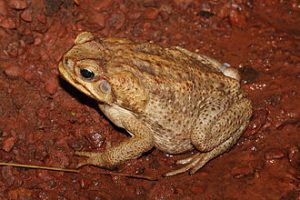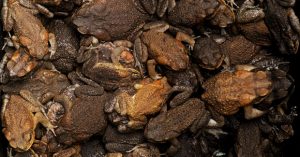Archive for September, 2017
Night of the cane toads
I recently asked my son Simon, now in his fifties, if he remembered anything of our visit to New Zealand when he was two. He thought for a moment. “I remember the frogs.” Ah yes, the frogs. Actually they were cane toads, but a two-year-old doesn’t bother with such distinctions.
Our flight from San Francisco to Auckland had a six-hour layover at Nandi, Fiji. When we arrived in Nandi at 4:00 am, we learned that the airline had very kindly provided a motel room so that we and the children could get a little rest. Tony and I looked forward to this. We were flying Qantas Airlines, and a bunch of young Australians partied all night in the rows behind us, oblivious to the flight attendant’s efforts to keep them quiet. The children, however, would have none of this going-to-bed nonsense. Their circadian rhythms completely out of whack, Simon and his brother were bright-eyed and ready for adventure.
We heard the toads first, a continuous high-pitched purring that filled the warm tropical night like the sound of a smoothly running motor boat. Then we saw them. Near the motel swimming pool stood a pole with a bug-zapping lamp attached. On the ground below, hundreds of cane toads clustered, waiting for the next flying creature to drop. The children were enthralled. Fortunately we did not allow them to go near the creatures, who can secrete a toxic poison.
The cane toad (Rhinella marina) is native to South and Central America. In 1935 they were introduced to Fiji and other places to control beetles on sugarcane plantations. The trouble was, the toads couldn’t jump high enough to eat the beetles, which live on top of cane stalks. With no natural predator in their new home, the cane toads bred in large numbers, and have proved to be an environmental disaster. They have voracious appetites, and will feed on almost any terrestrial animal and compete with native amphibians for food and breeding habitats. Their toxic secretions are known to cause illness and death in wildlife and in domestic animals that come into contact with them.
The cane toad disaster is a classic example of humans disturbing an ecological balance, inadvertently creating a new problem as they try to solve an existing one. Thinking about that tropical night makes me realize how little we still know about the complex interactions of the natural world. But on a personal, selfish note, the Fiji motel toads did provide entertainment for two rambunctious little boys.
The best laid schemes
The best laid schemes o’ Mice an’ Men
Gang aft agley
–Robert Burns
I’ll never forget how furious my mother was with me that day. I was about seven years old, and spending the day at my grandparents’ house while Mum ran last-minute errands. The next morning my parents, sisters and I were to leave on a camping trip, the first real vacation my family had ever had; Dad was an auto mechanic, and summer was his busiest time, with all the beach-goers flocking into our seaside town and needing help with their vehicles.
That afternoon I started to feel poorly. Grandma felt my forehead and promptly tucked me into bed. By the time Mum bustled in to pick me up the cause of my misery was obvious: my body covered with the red blisters of chickenpox.
 The memory of my mother weeping with disappointment came back to me two decades later. My husband, children and I were living in California, and could finally afford a return trip to New Zealand, our home country, after seven years abroad. My letters to parents for the previous several months had been full of plans and itineraries. About three weeks before our scheduled flight, David, our almost five-year old, came down with chickenpox. We phoned with the news. A few days later I wrote:
The memory of my mother weeping with disappointment came back to me two decades later. My husband, children and I were living in California, and could finally afford a return trip to New Zealand, our home country, after seven years abroad. My letters to parents for the previous several months had been full of plans and itineraries. About three weeks before our scheduled flight, David, our almost five-year old, came down with chickenpox. We phoned with the news. A few days later I wrote:
11 May 1968
I did write to you earlier in the week, but it was obsolete before it was even posted, so I tore it up instead. Isn’t this business just typical of kids? Anyway, here is the present state of play: we have bookings … [revised details]… But this flight depends on Simon [our two-year-old] coming out in spots this weekend, or Tuesday at the latest. The chances are higher that we shall postpone again until the following week …
Here is my calculation of the odds: Incubation period 11-21 days. Say David came out in spots on the 11th day, and Simon, from the same contact, on the 21st day (i.e., next Friday) he has two weeks to have it over with.
Say Simon missed David’s contact, and gets it from David, he can come out in spots on the 11th, 12th, or 13th day, and has 11 days, or a reasonable chance, to be free of scabs. (The airline will take him if a doctor will certify that he is not contagious.)
Say Simon decides not to get it at all, he will have passed the 21st day by two days.
The only problem will be if he gets it from David after the 13th day. The 14th day is borderline; after that we would have to cancel. We are in a bit of a quandary as to what to do then … Meanwhile we are all twiddling our thumbs, and willing Simon to produce ‘chickenpops’, as he calls them. It seems such an awful thing to do to such an innocent little poppet, but so far he has remained obstinately clear-skinned and perky…
The ironic thing is that we had a mumps crisis last week. One of the children’s closest friends came down with mumps about two weeks ago. We flapped around for a while, seriously considered gamma globulin, in spite of the cost (about $60 just for shots for myself and the children). We had braced ourselves to go through with it, when at the last minute the doctor just couldn’t get hold of any, so decided to try a new mumps vaccine instead. This is a lifelong immunity, but doesn’t take full effect for a month. By this time, he hoped that the vaccine would have built up enough antibodies to resist the disease. So far it is working. It is quite interesting being guinea-pigs, and considerably less expensive, at only $5 each. So instead we get the chickenpox!
…I have just come in from a walk – after four days in the house with kids, I needed it, but have come back feeling more depressed than ever about the whole business.
Monday – Have postponed until 31 May…
20 May 1968
Believe it or not, Simon actually produced some ‘chickenpops’ today, so we have started believing again that we are really coming. … I’m still not really convinced that we will arrive, but as we are going in this Wednesday to pick up the tickets, I had better stir myself out of this legarthy.
The irony of this story is that when we finally arrived at Nandi, Fiji on our way to New Zealand, the immigration officer noticed that David’s smallpox vaccination was outdated. (You needed this at that time to get into New Zealand). In our panic over chickenpox, we has totally spaced on this detail. Fortunately the officer was kind “Just get it done as soon as you get there,” he said as he stamped our papers.

